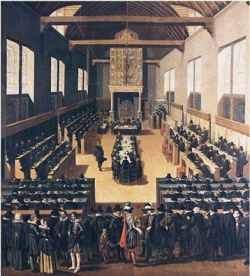 Synod condemns the error of those . . .
Synod condemns the error of those . . .
VI Who teach that not every election to salvation is unchangeable, but that some of the chosen can perish and do in fact perish eternally, with no decision of God to prevent it.
By this gross error they make God changeable, destroy the comfort of the godly concerning the steadfastness of their election, and contradict the Holy Scriptures, which teach that the elect cannot be led astray (Matt. 24:24), that Christ does not lose those given to him by the Father (John 6:39), and that those whom God predestined, called, and justified, he also glorifies (Rom. 8:30).
____________________________________
Another error associated with certain forms of Arminianism follows from the formulation of the dual decree described in refutation of errors, paragraph five. In this case, the Arminian argues, God will never withhold his salvation from those who do indeed believe, repent, and live holy lives before him. But since election is not absolute, and in this regard is only general and universal, there is no guarantee that those who are chosen by God will persevere in faith to the end, and therefore be saved.
As we have seen, the argument runs as follows. God has determined the plan of salvation, but has not chosen the specific individuals who are themselves to be saved. Those who fulfill God's requirements are considered to be numbered among the elect.
The problem with this should be obvious. Those who are presently in Christ, can take no comfort in the fact of their election, because there is absolutely no guarantee that they will remain in Christ until death. This places the onus on the individual to persevere in the Christian life, and does not give the believer the comfort of knowing that it is Christ who is even now ensuring that the elect will persevere to the end and be saved (cf. Luke 22:32; 1 John 2:1-2).
Scripture is crystal clear that Christ’s Spirit indwells us, and serves as a deposit guaranteeing that if we are in Christ at this moment, we will die in Christ. As Paul says in Ephesians 1:13 ff: “In him you also, when you heard the word of truth, the gospel of your salvation, and believed in him, were sealed with the promised Holy Spirit, who is the guarantee of our inheritance until we acquire possession of it, to the praise of his glory.” When we believe, we are indwelt by the Holy Spirit, who seals us until the day of the resurrection.
There is no evidence whatsoever found in Scripture which indicates that the Holy Spirit indwells us for a time and then leaves us if and when we commit specific sins, or if we cease to believe. Yes, the Psalmist pleads "take not your Holy Spirit from me," (51:11). But this is expressing the fear of worried believer, and does not mean that God threatens such a thing.
In fact, Peter declares (1 Peter 1:3-9), "Blessed be the God and Father of our Lord Jesus Christ! According to his great mercy, he has caused us to be born again to a living hope through the resurrection of Jesus Christ from the dead, to an inheritance that is imperishable, undefiled, and unfading, kept in heaven for you, who by God's power are being guarded through faith for a salvation ready to be revealed in the last time. In this you rejoice, though now for a little while, if necessary, you have been grieved by various trials, so that the tested genuineness of your faith—more precious than gold that perishes though it is tested by fire—may be found to result in praise and glory and honor at the revelation of Jesus Christ. Though you have not seen him, you love him. Though you do not now see him, you believe in him and rejoice with joy that is inexpressible and filled with glory, obtaining the outcome of your faith, the salvation of your souls."
In fact, it would seem from Peter’s words (and from Paul’s comments cited above), that the reason we continue to believe is because the Holy Spirit does, in fact, ensure that we continue to believe! In 1 John 2:1-2, the Apostle writes, “My little children, I am writing these things to you so that you may not sin. But if anyone does sin, we have an advocate with the Father, Jesus Christ the righteous. He is the propitiation for our sins, and not for ours only but also for the sins of the whole world.” It is the one in whom we are chosen (Christ--Ephesians 1:4), who presently stands as our defense attorney when we sin. He does not serve as a prosecutor!
Arminianism, in all its forms, does great injustice to the present priestly work of Christ. According to Arminianism, many for whom Christ supposedly dies, and for whom he is currently interceding, somehow manage to slip through his fingers, escape his grasp, fall away, and then suffer eternal loss. The whole point of Christ’s present work as Advocate is that when we try and get away from God, it is Christ who keeps us in the fold. The good shepherd will lose none of the sheep given him by the father (John 6:37; 10:29). This is Jesus' promise to us!
Sadly, Arminianism robs the Christian of the comfort of assurance of salvation won for them by Christ, and instead instills unnecessary fear and doubt in the people of God.
 Wednesday, May 28, 2008 at 01:16PM
Wednesday, May 28, 2008 at 01:16PM  We often speak of the "Keswick Movement" on the White Horse Inn. Here are a series of lectures detailing the history of the Keswick movement, along with an analysis of some of its weaknesses (h.t. Lee Irons). Click here: Andy Naselli » Blog Archive » Keswick Theology
We often speak of the "Keswick Movement" on the White Horse Inn. Here are a series of lectures detailing the history of the Keswick movement, along with an analysis of some of its weaknesses (h.t. Lee Irons). Click here: Andy Naselli » Blog Archive » Keswick Theology










